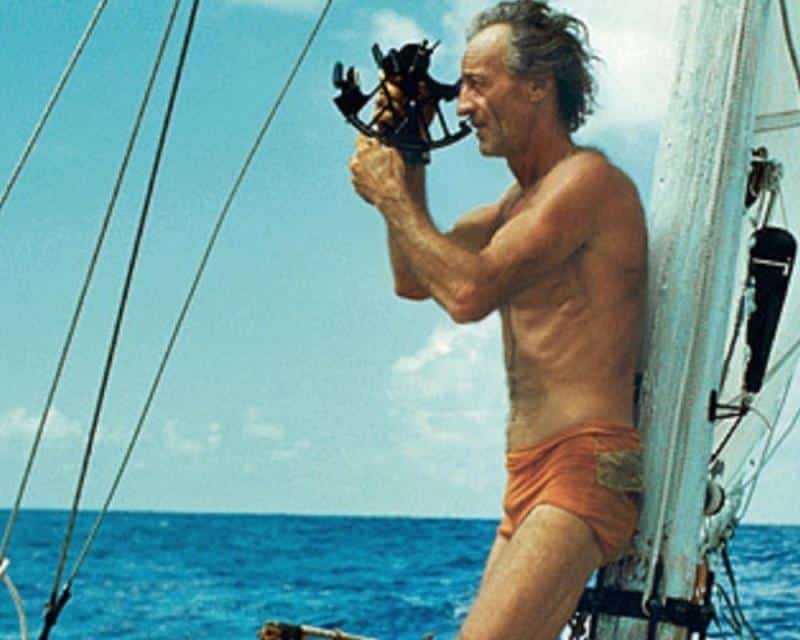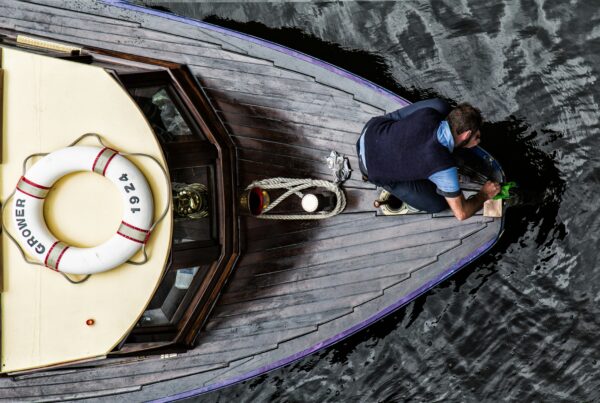Bernard Moitessier, the esteemed French sailor, is revered for his remarkable circumnavigation of the globe and his profound philosophical insights gained from life at sea. Born on April 10, 1925, in Hanoi, Vietnam, Moitessier’s love affair with sailing began during his formative years. Growing up in Saigon, he immersed himself in the rivers and coastal waters, cultivating a deep connection with the ocean.
Moitessier’s initial foray into sailing involved a modest wooden dinghy that he acquired as a teenager. This unassuming vessel opened the door to a world of seafaring, kindling a passion that would shape his entire existence. The freedom and simplicity of life at sea captivated him, as he learned to navigate by the stars, harness the wind’s power, and harmonize with nature.
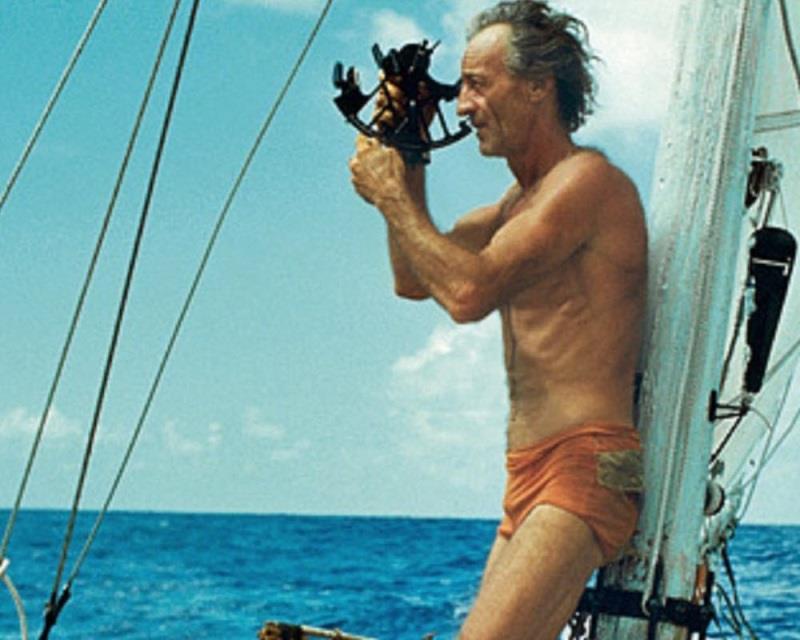
Early Voyages
In the late 1950s, Moitessier embarked on a series of extraordinary voyages, navigating the Atlantic and Pacific Oceans. These early adventures honed his seamanship skills and instilled within him a profound understanding of the sea. He gained invaluable experience in handling various types of boats, ranging from small yachts to larger, ocean-going vessels.
“A man must have the sea within him; it is his soul. If he wants to know himself, he must know the sea. He must learn to sail alone in a small boat.”
The Long Way, Bernard Moitessier
Moitessier’s most renowned journey commenced in 1968 when he embarked on the Sunday Times Golden Globe Race—an audacious endeavor to solo circumnavigate the globe non-stop. His faithful vessel, the Joshua, named in homage to Joshua Slocum, the first person to achieve such a feat, became his trusted companion throughout the arduous voyage.
The Long Way
As Moitessier traversed the vast expanses of the Southern Ocean, confronting tempestuous storms and towering waves, he weathered numerous knockdowns that tested his resolve and seamanship. In his literary masterpiece, “The Long Way,” Moitessier vividly recounts these harrowing moments, painting a visceral picture of nature’s raw power and the delicate balance between life and death on the open sea.
Within the pages of “The Long Way,” Moitessier expounds upon his philosophical outlook on life. His profound connection with nature and the ocean compelled him to scrutinize the values of modern society. Moitessier discovered solace and meaning in the simplicity of life at sea, advocating for a return to the fundamental elements that define our existence. He ardently believed that the true essence of humanity lies in our ability to forge a deep connection with nature and live harmoniously with the world around us.
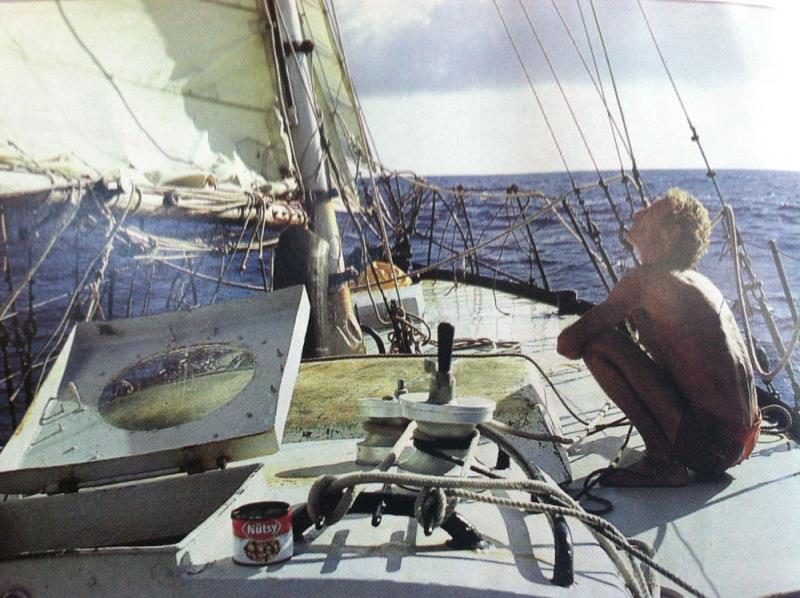
Despite being on the cusp of victory, Moitessier shocked the sailing world by making the audacious decision to abandon the race. Motivated by his spiritual and philosophical beliefs, he chose to continue sailing, steering clear of the finish line and charting a new course toward Tahiti. This act of defiance cemented Moitessier’s status as a legendary figure in maritime history.
“You do not ask a tame seagull why it needs to disappear from time to time toward the open sea. It goes, that’s all.”
The Long Way, Bernard Moitessier
On Tahiti
Upon arriving in Tahiti, Moitessier embraced a simple and self-sustaining lifestyle. He constructed a home and lived off the land, cherishing the tranquility of the Pacific islands. Although he continued to undertake sailing expeditions, his voyages became more personal and introspective, less concerned with breaking records or winning races. Moitessier’s later years were dedicated to writing and sharing his experiences, inspiring a new generation of sailors and adventurers.
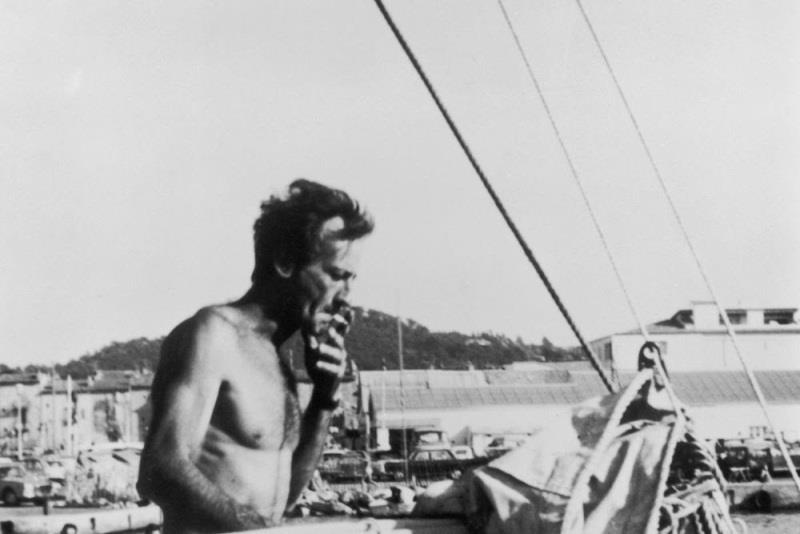
In addition to “The Long Way,” Moitessier penned several other notable books, including “Tamata and the Alliance,” which chronicles his experiences living among the Polynesians and exploring their traditional ways of life. Through his writing, Moitessier sought to convey the profound beauty and wisdom he encountered during his journeys, inviting readers to question their own values and priorities.
In his book “Tamata and the Alliance,” Bernard Moitessier delves into his experiences living among the Polynesians and explores their traditional ways of life. Immersed in the vibrant cultures of the Pacific islands, Moitessier found himself captivated by the deep-rooted connection that the Polynesians had with the natural world.
Polynesian Way of Life
Moitessier discovered a profound beauty in the Polynesian way of life, characterized by a harmonious coexistence with nature. The Polynesians lived in close communion with the ocean, relying on their navigational skills and deep understanding of the currents, stars, and winds to traverse vast distances across the Pacific. Moitessier recognized their intricate knowledge of the sea as a testament to the human capacity to establish a profound bond with the natural environment.
The Polynesians’ wisdom and spiritual connection to nature left a lasting impression on Moitessier. He marveled at their deep respect for the ocean and their belief in its intrinsic power and sacredness. Their navigational techniques passed down through generations, demonstrated a level of precision and intuition that Moitessier found awe-inspiring.
Living among the Polynesians, Moitessier witnessed their sustainable and self-sufficient lifestyle. They practiced traditional agriculture, cultivating crops that were well-suited to the local climate and using traditional fishing techniques that maintained the delicate balance of marine ecosystems. Their deep reverence for nature was evident in their practices, as they only took what was necessary and ensured the continued abundance of resources for future generations.

Philosophy in Polynesia
Moitessier’s encounters with the Polynesians offered him a new perspective on life and reinforced his own beliefs about the importance of forging a harmonious relationship with the natural world. He saw their way of life as a stark contrast to the values of modern society, which often prioritized material wealth and convenience at the expense of environmental sustainability.
Through “Tamata and the Alliance,” Moitessier aimed to convey the profound wisdom he had encountered among the Polynesians and inspire readers to reevaluate their own relationship with nature. He highlighted the importance of preserving traditional knowledge and embracing a more sustainable and respectful approach to the environment.
Moitessier’s experiences living among the Polynesians revealed to him the interconnectedness of humanity and the natural world. He recognized that by immersing ourselves in nature and understanding its rhythms, we can gain a deeper understanding of ourselves and our place in the universe. This insight became a cornerstone of Moitessier’s philosophy, resonating with readers and inspiring them to seek a more profound connection with the natural world around them.
His Passing
Bernard Moitessier passed away on June 16, 1994, in the remote islands of Vanuatu. His legacy as an intrepid sailor and philosopher of the sea endures through his literary works and the lasting impact he made on the sailing community. Moitessier’s extraordinary life and unwavering love for the ocean serve as a testament to the boundless spirit of exploration and the profound connection we can forge with the natural world. His philosophy continues to resonate with those who seek a deeper understanding of themselves and their place in the world, inspiring future generations to embark on their own voyages of self-discovery and to cherish the beauty and wisdom of the sea.

Sources:
- Moitessier, Bernard. “The Long Way.” Adlard Coles, 2007.
- Moitessier, Bernard. “A Sea Vagabond’s World: Boats and Sails, Distant Shores, Islands and Lagoons.” Sheridan House, 2002.
- Moitessier, Bernard. “Tamata and the Alliance.” Adlard Coles, 1995.
- Moitessier, Bernard. “Cape Horn: The Logical Route.” Fernhurst Books, 2011.
- “Bernard Moitessier.” Goodreads, www.goodreads.com/author/show/333702.Bernard_Moitessier. Accessed 25 May 2023.
We encourage you to use Rabbet to connect with the rest of the boating community! Hop onto our Learn tab to find more articles like this. Join our various forums to discuss with boating enthusiasts like you. Create an account to get started.
Visit us on Pinterest to collect content and inspire others.

